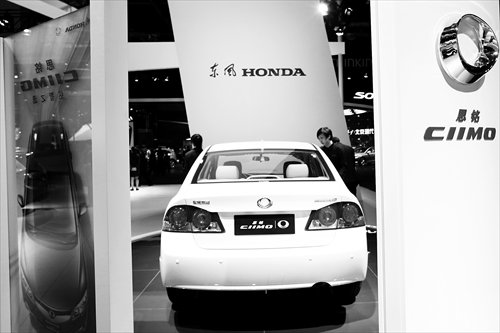HOME >> BUSINESS
JV independent brands pushed out of market
By Yang Jing Source:Global Times Published: 2015-7-10 5:03:01
Lack of popularity makes automakers reluctant to mass produce vehicles

A Ciimo sedan is displayed at the 16th International Automobile & Manufacturing Technology Exhibition on April 20 in Shanghai. Photo: IC
Declining sales
In around 2010, based on technology introduced from their foreign partners, several joint ventures developed independent brands and models, and owned their intellectual property rights.
Ciimo, the first brand launched by joint venture Dongfeng Honda in 2012, suspended production in April, Beijing-based The Economic Observer newspaper reported on July 4.
The average monthly sales of Ciimo reached around 1,500 units in the first year after launch but gradually dropped to less than 100 units in 2014, the report said, noting that there has not even been any production since April.
Although the company denied halting production of Ciimo, one Dongfeng Honda 4S shop worker said there was currently no inventory for the brand, according to the report.
"Ciimo is not off production, but you may need to make a preorder for it," one member of sales staff at the 4S shop in Beijing told the Global Times Tuesday.
When Dongfeng Honda launched Ciimo as its first self-owned brand in April 2012, it targeted young people seeking to purchase their first cars, according to the company's press release.
Dongfeng Honda is not the only joint venture that had hoped to satisfy an increasingly diversified Chinese market with independent brands.
GAC Honda, a joint venture established by Guangzhou Automobile Group Co and Honda, which was the first auto joint venture in China, launched its independent brand Everus in 2011, which is also facing declining sales. In 2014 it sold only 4,500 units and halted production since March this year, the report said.
A symbolic solution
Among the independent brands owned by joint ventures, Venucia from Dongfeng Nissan and Baojun from SGMW have enjoyed relatively good sales, Zhang Zhiyong, a Beijing-based auto industry analyst, told the Global Times Tuesday.
"But compared with major domestic brands and foreign brands, independent brands from joint ventures are marginalized in the market, " Zhang said.
Independent brands from joint ventures depend mainly on technology provided by foreign partners, and without their firm support, the sound development of these independent brands is just empty talk, according to Zhang.
Another reason for these brands' weak performance may stem from the very reason they were established. It had been said that the government once expected joint ventures to develop their own brands, Zhang said.
China's auto industry regulator had expected domestic auto brands to take half of the Chinese market by the end of 2015 but found that this objective would be hard to achieve with only brands developed by local automakers. Independent brands from joint ventures were then seen as the perfect solution, the report said.
While enterprises could achieve their goals by only launching independent brands, this may not allow them to go into mass production or gain full support, Gao Jian, an analyst at the Shanghai-based consultancy LMC Automotive, told the Global Times Wednesday.
"Joint ventures' independent brands are more like a symbol rather than something with real growth potential, especially when the market is not as strong as it used to be," Zhang said.
Chinese customers purchased 1.9 million vehicles in May, 4.55 percent lower than the previous month and 0.4 percent down year-on-year, according to data released by the China Association of Automobile Manufacturers on June 10.
Under these circumstances, joint ventures, which are going all out just to hold on to their market shares for their joint brands, hardly have the resources to promote independent brands, according to Zhang.
Following new trend
Joint ventures' independent brands have also caused controversy in the auto industry, since they are regarded as putting extra pressure on Chinese carmakers.
Xu Liuping, president of the Changan Automotive Group, said joint ventures' independent brands are only older products that have undergone minor changes, and cannot be regarded as innovation, according to the report.
Now, with Chinese authorities actively encouraging the development of new energy vehicles in recent years, joint ventures are turning to their independent brands to tackle the new trend.
One such example is CBA, a joint venture of BMW and Huachen Auto Group, which launched its electric car brand Zinoro in 2014 and has been promoting car rentals of its Zinoro 1E model since then.
Starting their own brands help improve joint ventures' ability in car development, however, with China's new energy vehicles market at a very beginning stage, these carmakers will not make much investment in the procedures after research and development, Gao said.
Meanwhile, since many foreign partners in these joint ventures have their own new energy vehicles and are introducing them to the Chinese market, such as BMW i3 and Volkswagen's electric up, it is less possible for these foreign partners to support joint ventures' independent green cars, according to Gao.
Experts believe that independent brands cannot prosper from just following the policy trend, the report said, noting that research and ability to develop will determine success.
Posted in: Companies